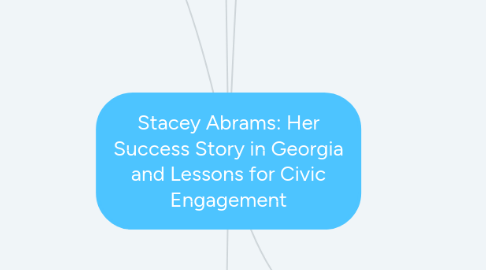
1. Early Career
1.1. Member of the Democratic Party
1.2. 1996-1999: Yale Law School
1.3. 2002: Appointed Deputy City Attorney for City of Atlanta
1.4. 2007-2017: Georgia House of Rep.
1.5. 2013: Founded the New Georgia Project
2. Mission and Goals
2.1. 2018: Founded Fair Fight Action
2.1.1. Georgia-based voting organization that aims to educate voters and promote fair elections
2.1.2. There is currently a federal lawsuit in place regarding the voting process in Georgia.
2.1.2.1. In particular, the organization is trying to improve how these 3 stages of voting are run: (1) voter registration, (2) ballot access, (3) ballot counting
2.1.2.2. Fighting to ensure Georgia is required to meet preclearance standards of the Voting Rights Act
2.2. Influential figures
2.2.1. Fannie Lou Hamer
2.2.1.1. Abrams pointed to voting rights activist Hamer (co-founder of the Freedom Democratic Party and speaker at the 1964 Democratic Convention) as an influential hero of the modern civil rights movement.
2.2.2. Her parents and grandmother, who were reluctant to vote as Black people in Georgia, motivated Abrams to begin her journey of promoting voting rights
2.3. Finding a balance between grassroots organizing and office holding
2.4. Promote civic engagement-- particularly for communities of color
2.4.1. Fighting voter suppression, educating about voting rights, protecting rights (LGBTQ+, women, reproductive health, etc.),
2.4.1.1. Believes the most prominent and effective way to prevent the accomplishment of this goal of political engagement is voter suppression
2.4.1.2. Also believes ensuring people have the reason ( and knows their right) to vote is crucial in obtaining this goal
2.4.2. Engagement in politic by both grassroots political organization and by opening opportunities for political leadership positions
2.5. Georgia and the future of Southern politics
2.5.1. Believes Georgia is on a trajectory to becoming an increasingly politically significant state. The 2020 elections proved this to be true.
3. Lessons for Civic Engagement
3.1. It's important to tackle all aspects of litigation, legislation, and advocacy
3.1.1. Litigation
3.1.1.1. Federal lawsuit that is tackling de facto voter discrimination
3.1.2. Legislation
3.1.2.1. Reviewing, analyzing pre-existing legislation in Georgia and in smaller communities, and promoting legislation to more effectively increase voter participation and civic engagement
3.1.3. Advocacy
3.1.3.1. Recognizes that a lot of the people she's talking to have experienced generations of poverty, discrimination, and voter suppression
3.1.3.2. Tackling a variety of significant issues that directly impact the community: criminal justice system reform, creating jobs, reproductive rights
3.1.4. Both top-down and bottom-up methods
3.2. The importance of fully and accurately understanding the needs of the community
3.3. To understand not only the members of the community, but the community itself.
3.3.1. Deliberate strategies based on a data-driven analysis of the community
3.4. Stacey Abram's advice on how to respond to setbacks and challenges in life
4. Governor Elections
4.1. Abrams' speech to end her candidacy
4.2. Final results showed that Abrams had lost the 2018 race by only 55,000 votes. Abrams did not accept this result/refused to concede because of the claimed voter suppression/vote purging that disproportionately affected Black voters.
4.2.1. The House Oversight Committee began an investigation in response to this event.
4.2.1.1. In a letter, the Committee Chairman and Chairman of the Subcommittee on Civil Rights and Civil Liberties write about the Secretary of State's cancellation of 1.4 million voter registrations (also noteworthy is the fact that this was done under Kemp's leadership, who was also the other candidate for governorship)
4.2.1.1.1. It's not uncommon, however, that a secretary of state is in charge of overseeing an election they're also a candidate in
4.2.2. The Committee also noted the suspicious nature of 53,000 voter registration applications-- the majority being those of African American voters-- on hold for further screening
4.2.2.1. Some argue that this is a necessary form of ensuring accuracy in the voting list
4.2.2.2. In March 2020, they released a memorandum where they expressed concern about newly emerging facts about the 2018 election.
4.3. 2018 governor elections against Republican Brian Kemp
5. 2020 Elections
5.1. 2020 Elections
5.2. Strength of data
5.2.1. “She saw it coming. The data was there if you wanted to look at it. The problem was nobody was really willing to look at the data.” (Jen Jordan, Georgia's Democratic senate)
5.2.2. The Abrams Playbook: The Strategy and Path to Victory in 2020
5.2.2.1. Reflected a meticulous use of data to analyze the changing demographic and electorate, and ultimately determine an effective strategy for a Democratic win in the 2020 elections
5.2.2.1.1. Electorate trends: share of white voters is decreasing, share of African American voters is increasing, AAPI and Latinx votes are significant and could definitely affect voting outcomes
5.2.2.1.2. Overall, there is a larger proportion of younger votes (compared to that of other battleground states). This serves as an advantage.
5.2.2.2. Determined that Georgia was just an important of a battleground as any other conventional battleground state. This was determined through an analysis of voting patterns, the different populations, and electorate trends
5.3. Presidential Elections
5.3.1. Record number of voters in Georgia with 7.6 million registered voters
5.3.1.1. Her campaign began to aggressively investing funds, effort, and time years before the actual election. They lead an "extensive voter contact effort" through their volunteer program.
5.3.1.2. Her campaign aimed to get marginal gains among the white population
5.3.1.3. Instead of narrowing their target population to the "possibly persuadable", they made sure to put effort into gaining "every possible vote".
5.4. Senate Elections
5.4.1. Raised $3.6 million in two days for the Georgia runoff elections
5.4.1.1. "We need to reconsider this election... as the Doug Jones of 2020, where we know that the essential nature of this election changes the future of our country, protects health care, protects access to jobs and protects access to justice" (Abrams in an interview with ABC News)
5.4.2. The last time a Democratic senator was elected in Georgia was Cleland's victory in 1996

